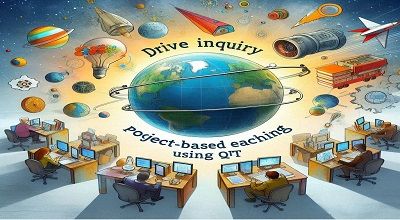Drive Inquiry In Project-Based Learning Using QFT
Using quantum field theory (QFT) to drive inquiry in project-based learning can be a fascinating and innovative approach. Here’s a guide on how you might integrate QFT into your project-based learning:
Introduction to Quantum Field Theory (QFT):
Start by introducing the basic concepts of Quantum Field Theory. Explain how it is a theoretical framework in quantum physics that describes the fundamental forces and particles in the universe.
Relevance to Real-World Applications:
Connect QFT to real-world applications. Discuss how advancements in quantum physics have led to technologies like quantum computing, medical imaging, and other cutting-edge innovations.
Project Selection:
Allow students to choose projects that relate to quantum field theory. For example:
- Simulating quantum systems using computer programming.
- Researching and presenting on quantum technologies.
- Designing experiments that illustrate quantum principles.
Hands-on Activities:
Incorporate hands-on activities that simulate quantum phenomena. This could include simple experiments, simulations, or interactive demonstrations that help students grasp abstract concepts.
Collaborative Learning:
Encourage collaborative learning by forming teams. This reflects the collaborative nature of scientific research and helps students develop teamwork and communication skills.
Inquiry-Based Questions:
Guide students in forming inquiry-based questions. These questions should prompt investigation, critical thinking, and problem-solving. Examples include:
- How does quantum entanglement work, and what are its potential applications?
- Can we design a simple experiment to demonstrate wave-particle duality?
- What are the current challenges in quantum computing, and how might they be addressed?
Research and Exploration:
Provide resources for students to conduct research. Encourage them to explore various aspects of QFT, delve into historical developments, and investigate current debates and challenges in the field.
Expert Interviews:
Arrange for guest speakers or experts in the field to talk to the students. This could be done in person or virtually. Students can prepare questions and engage in a Q&A session to deepen their understanding.
Project Presentation:
Have students present their projects to the class. This can take the form of traditional presentations, interactive demonstrations, or even creative displays. This helps reinforce their learning and allows them to practice communication skills.
Reflective Discussions:
Conclude the project with reflective discussions. Encourage students to share their insights, challenges faced, and how their understanding of QFT has evolved. Discuss potential future applications and advancements in the field.
For More Details
By integrating QFT into project-based learning, you not only make the subject more engaging but also foster critical thinking, collaboration, and a deeper understanding of the scientific method. This approach aligns with the principles of inquiry-based learning, where students take an active role in their education and develop a passion for exploration and discovery.
